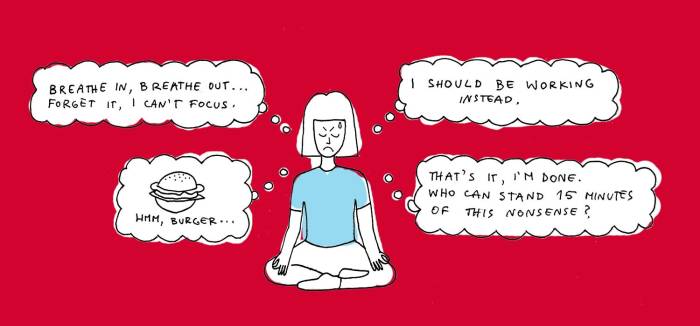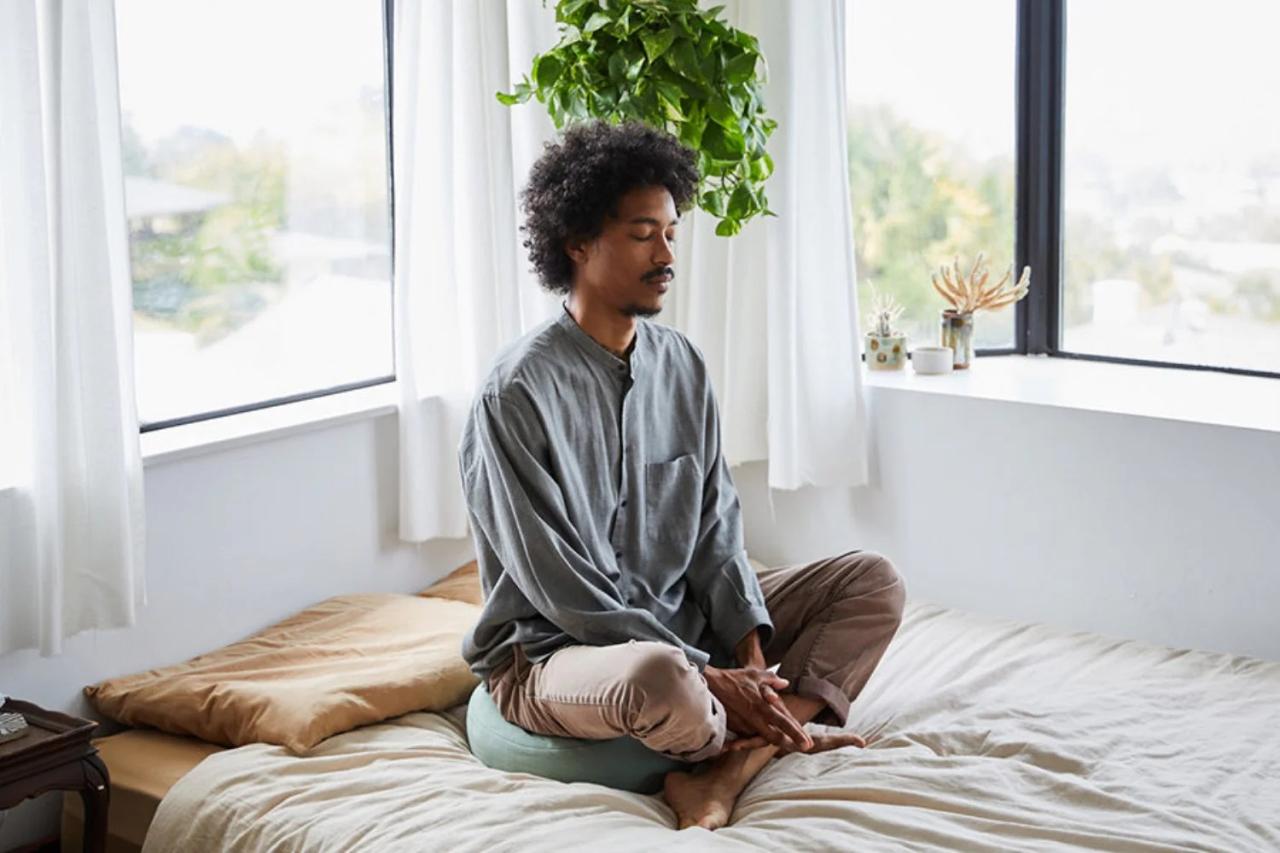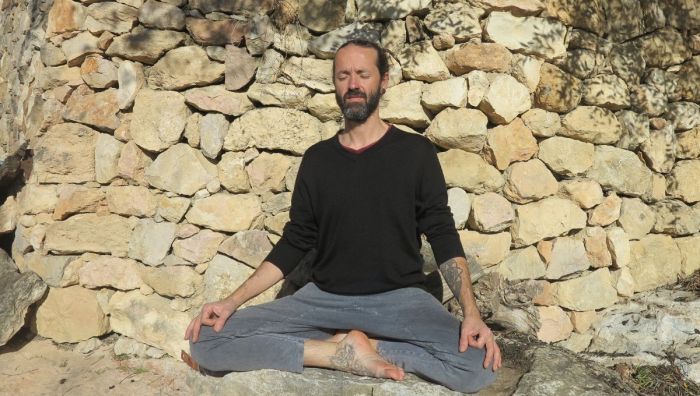Kicking off with 12 Daily Meditation Habits to Adopt, this guide will take you through the transformative journey of incorporating meditation into your daily routine. From benefits to establishing a routine, setting intentions, and mindfulness practices, get ready to embrace a new way of living.
Benefits of Daily Meditation Habits

Incorporating meditation into daily routines can have numerous benefits for overall well-being and mental health.
Improved Focus and Clarity
Meditation helps to enhance focus and concentration, allowing individuals to approach tasks with a clear and sharp mind.
Stress and Anxiety Reduction
Meditation has been proven to be effective in reducing stress and anxiety levels by promoting relaxation and calming the mind.
Emotional Well-being, 12 Daily Meditation Habits to Adopt
Regular meditation practice can lead to improved emotional stability, better self-awareness, and a more positive outlook on life.
Types of Meditation Practices

There are various types of meditation practices that are suitable for daily practice. Each type offers unique benefits and techniques to help individuals achieve a state of mindfulness and inner peace.
Mindfulness Meditation
- Mindfulness meditation involves focusing on the present moment without judgment. It helps individuals become more aware of their thoughts and emotions, leading to reduced stress and improved mental clarity.
- Practitioners often focus on their breath or bodily sensations to anchor themselves in the present moment and cultivate a sense of calm and awareness.
- Regular practice of mindfulness meditation can enhance self-awareness, emotional regulation, and overall well-being.
Loving-Kindness Meditation
- Loving-kindness meditation focuses on cultivating feelings of compassion and love towards oneself and others.
- Practitioners generate feelings of kindness, empathy, and goodwill through the repetition of phrases such as “May I be happy, may you be happy, may all beings be happy.”
- This practice helps individuals develop a sense of connection with others, reduce negative emotions, and enhance their capacity for empathy and kindness.
Guided Meditation
- Guided meditation involves following the instructions of a teacher or recorded audio to lead practitioners through a meditation session.
- It is particularly beneficial for beginners as it provides structure, guidance, and support in cultivating a meditation practice.
- Guided meditations can focus on various themes such as relaxation, stress relief, gratitude, or self-compassion, making it easier for individuals to start and maintain a regular practice.
Establishing a Routine

To maintain a consistent daily meditation practice, it is essential to establish a routine that works for you. Here are some tips to help you create and stick to a daily meditation schedule.
Finding a Quiet and Comfortable Space
When setting up your meditation routine, it is crucial to find a peaceful and comfortable space where you can relax and focus. Choose a quiet area in your home where you won’t be disturbed. You may want to decorate this space with calming elements like candles, cushions, or plants to enhance the ambiance.
Overcoming Obstacles
Maintaining a daily meditation habit can be challenging, especially when life gets busy. Here are some strategies to help you overcome obstacles and stay committed to your practice:
- Acknowledge Resistance: Understand that resistance is a natural part of the process. Accept it without judgment and gently guide yourself back to your practice.
- Start Small: If finding time for a long meditation session is difficult, start with just a few minutes each day. Consistency is key, even if it’s just a short practice.
- Set Reminders: Use alarms, sticky notes, or meditation apps to remind yourself to meditate daily. Establishing a specific time for your practice can help make it a regular part of your routine.
- Find an Accountability Partner: Partnering with a friend or joining a meditation group can provide support and encouragement to help you stay on track with your daily practice.
- Be Flexible: Life is unpredictable, and there may be days when you are unable to meditate at your usual time. Be flexible and willing to adjust your schedule when needed, but prioritize your practice whenever possible.
Setting Intentions and Goals

Setting intentions before each meditation session is a crucial step in maximizing the benefits of your practice. By clearly defining what you hope to achieve or focus on during your meditation, you create a sense of purpose and direction for your session. This can help you stay more present and engaged, as well as deepen your overall experience.
Importance of Setting Intentions
Setting intentions allows you to cultivate mindfulness and awareness, guiding your thoughts and energy towards a specific goal or outcome. It can help you let go of distractions and center your mind on what truly matters to you in that moment.
- Clarifies your purpose: By setting intentions, you clarify what you want to achieve or work on during your meditation, leading to a more focused practice.
- Enhances concentration: Having a clear intention helps you stay present and concentrated, reducing wandering thoughts and mental chatter.
- Deepens self-awareness: Setting intentions encourages self-reflection and introspection, allowing you to connect with your inner self on a deeper level.
Aligning Meditation Habits with Personal Aspirations
Aligning your meditation habits with your personal aspirations and values is essential for creating a meaningful and sustainable practice. By setting goals that resonate with your beliefs and desires, you can harness the full potential of meditation to support your growth and well-being.
Aligning your meditation practice with your personal goals can lead to a sense of purpose and fulfillment, fueling your motivation to continue and evolve in your journey.
- Reflect on your values: Take time to reflect on what matters most to you and how your meditation practice can support those values.
- Set realistic goals: Define achievable goals that align with your aspirations, whether they involve personal growth, emotional healing, or spiritual development.
- Stay committed: Make a commitment to yourself to honor your intentions and goals, integrating them into your daily meditation routine with consistency and dedication.
Mindfulness in Daily Activities

Integrating mindfulness practices into daily activities can significantly enhance the quality of our lives by fostering a sense of presence and awareness in each moment. This practice allows us to fully engage with our surroundings and experiences, leading to a deeper connection with ourselves and the world around us.
Bringing Mindfulness to Daily Activities
- When eating: Take the time to savor each bite, noticing the flavors, textures, and sensations. Avoid distractions like screens or multitasking, and focus on the act of eating mindfully.
- While walking: Pay attention to each step, the feeling of the ground beneath your feet, and the movement of your body. Take in the sights, sounds, and smells of your surroundings without judgment.
- During work: Practice mindful breathing or take short breaks to refocus your attention. Notice any tension in your body and take a moment to relax and reset.
Impact of Mindfulness in Daily Routines
Mindfulness in daily activities can lead to reduced stress, improved focus, and a greater sense of overall well-being. By incorporating mindfulness practices alongside meditation habits, individuals can cultivate a more balanced and harmonious lifestyle.
Final Conclusion: 12 Daily Meditation Habits To Adopt
In conclusion, adopting these 12 daily meditation habits can lead to a profound shift in your mental and emotional well-being. By making mindfulness a part of your daily life, you pave the way for a more peaceful and fulfilling existence.